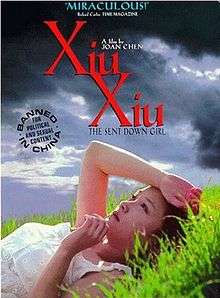Xiu Xiu: The Sent Down Girl
| Xiu Xiu: The Sent Down Girl | |
|---|---|
 | |
| Directed by | Joan Chen |
| Produced by |
Alice Chen Joan Chen |
| Written by |
Geling Yan (novel) Joan Chen (screenplay) |
| Starring |
Li Xiaolu Lopsang Zheng Qian |
| Music by | Johnny Chen |
| Distributed by | Good Machine |
Release dates | February 1998 (Berlin Film Festival) |
Running time | 99 minutes (theatrical) |
| Country | China |
| Language | Mandarin |
Xiu Xiu: The Sent Down Girl (Chinese: 天浴; pinyin: Tiān Yù) is a 1998 Chinese film directed by actress Joan Chen based during the 1970s in People's Republic of China, during the Cultural Revolution's Down to the Countryside Movement. This drama film is the directorial debut of Chen.[1] The film stars Li Xiaolu (Chinese: 李小璐) and Lopsang (Chinese: 洛桑群培).
Plot
Xiu Xiu (Chinese: 秀秀), a 15-year-old girl living in the city of Chengdu, moves out to study horses in the countryside with a nomadic Tibetan. She is told that after six months, she will return to take charge of her all-girl cavalry unit. Her only friend is the eunuch horseman, Lao Jin, who takes care of her while teaching her to herd horses. However, after the six months are up she quickly discovers that she is not returning.
As Xiu Xiu loses hope, she falls for the lies of a peddler who tells her he can get her out of the place, but does not return after having sex with her. Her innocence is slowly corrupted by a stream of men who use her only for sex, barely keeping up the conceit by telling her that they are able to get her back to her hometown. Lao Jin, emasculated and docile, can only watch in sadness as Xiu Xiu loses hope in the system and in herself. Xiu Xiu even starts to believe in the lies the men perfunctorily tell her, as she spitefully lectures Lao Jin that the men who come in the night and have their way with her are important men who can help her get back.
Xiu Xiu gets pregnant and has to go for a traumatic abortion in the hospital. The female doctors gossip about Xiu Xiu. After the operation, she gets raped by one of the patients, a man who shot himself in the foot to get handicapped benefits in the state-controlled economy. Lao Jin gets angry and assaults the rapist, but he is restrained by the other patients while the doctors make snide remarks about how Xiu Xiu enjoys being raped.
After Xiu Xiu recuperates, she tries to shoot herself in the foot so she can get sent back home, but she cannot bring herself to pull the trigger. She asks Lao Jin to shoot her foot. But she decides against it and intimates to him to shoot her dead instead. Lao Jin shoots her, then shoots himself and falls on her body so they can be finally together in death.
Reception
Distribution
Although the U.S. distributor claimed the film was banned in China for sexual and political content, the script was actually approved by the Chinese government. The film was only banned after the filmmakers decided not to wait for permits before shooting in Tibet (such permits are required for a film to receive official approval).[2]
Awards and nominations
- 1998: won for Best Film (Joan Chen)
- 1998: won for Best Director (Joan Chen)
- 1998: won for Best Screenplay Adapted from Another Medium (Joan Chen)
- 1998: won for Best Actress (Li Xiaolu)
- 1998: won for Best Actor (LupSang)
- 1998: nominated for the Golden Bear[3]
- Fort Lauderdale International Film Festival
- 1998: won the Jury Award
- 1999: won the Special Jury Prize
- 1999: nominated for the Grand Prize
- 1999: won Best Actress (Li Xiaolu)
- Mons International Festival of Love Films
- 1999: won the Grand Prize
- 1999: won the International Freedom Award
- 2000: nominated for Best First Feature Over $500,000 (John Chen, shared with co-producer Alice Chan Wai-Chung)
References
- ↑ "Wettbewerb/In Competition". Moving Pictures, Berlinale Extra. Berlin: 37. 11–22 February 1998.
- ↑ Tian yu on IMDb
- ↑ "Berlinale: 1998 Programme". berlinale.de. Retrieved 2012-01-23.
External links
- Xiu Xiu: The Sent Down Girl at the Internet Movie Database
- Xiu Xiu: The Sent Down Girl at AllMovie
- Xiu Xiu: The Sent Down Girl at Rotten Tomatoes
- Xiu Xiu: The Sent Down Girl at Yahoo! Movies
- Xiu Xiu: The Sent Down Girl at Popmatters review
- Xiu Xiu: The Sent Down Girl at Box Office Mojo